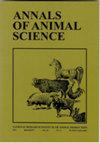膳食中添加姜黄素与代谢综合征的关系
IF 2.2
4区 农林科学
Q2 AGRICULTURE, DAIRY & ANIMAL SCIENCE
引用次数: 0
摘要
摘要代谢综合征是随着社会生活方式快速振荡的加剧而出现的最常见疾病之一。另一方面,近年来,各种药用植物被广泛用于多种治疗方法。其中,姜黄素和姜黄是植物根茎中衍生的主要成分,对预防代谢综合征有显著作用。由于其抗氧化和抗炎活性,姜黄及其生物活性成分姜黄素的生物活性通过增加胰岛素释放具有抗糖尿病特性,通过增加脂肪酸摄取具有抗高脂血症作用,通过减少脂肪生成具有抗肥胖特性,通过增加一氧化氮合成具有抗高血压特性。此外,饲料中姜黄及其生物活性元素姜黄素的存在显著影响了家禽的生产力、健康和福利。根据人体和动物试验,姜黄或姜黄素在一些代谢综合征的膳食补充和补充治疗中具有重要的价值。这一情景强调了姜黄素(姜黄)对家禽健康的潜在影响及其在代谢综合征补充治疗中的作用。需要额外的高质量临床试验调查来确定姜黄素补品的临床效率。本文章由计算机程序翻译,如有差异,请以英文原文为准。
The relationship between dietary curcumin supplementation and metabolic syndrome
Abstract Metabolic syndrome is one of the utmost frequent diseases with the augmentation of the fast oscillations in societies’ lifestyles. On the other side, various medicinal plants have recently been extensively used for plentiful therapeutics. Among these, curcumin and turmeric are the main components derivative from the rhizome of plants, with significant effects on preventing metabolic syndromes. Due to their antioxidant and anti-inflammatory activities, the biological activities of turmeric and its bioactive element, curcumin, have antidiabetic properties via augmenting insulin release and anti-hyperlipidemia effects via enhancing fatty acids uptake, anti-obesity properties via declining lipogenesis, and antihypertensive properties via augmenting nitric oxide synthesis. Moreover, the dietary presence of turmeric and its bioactive element, curcumin, significantly affected poultry productivity, health and welfare. According to human and animal trials, turmeric or curcumin has important values as dietary supplementation and complementary therapy in some metabolic syndromes. This scenario highpoint on the potential effects of curcumin (turmeric) on poultry health and its role in complementary therapy in metabolic syndrome. Additional high-quality clinical trial investigations are required to establish the clinical efficiency of the curcumin complement confidently.
求助全文
通过发布文献求助,成功后即可免费获取论文全文。
去求助
来源期刊

Annals of Animal Science
农林科学-奶制品与动物科学
CiteScore
4.00
自引率
5.30%
发文量
138
审稿时长
6-12 weeks
期刊介绍:
Annals of Animal Science accepts original papers and reviews from the different topics of animal science: genetic and farm animal breeding, the biology, physiology and reproduction of animals, animal nutrition and feedstuffs, environment, hygiene and animal production technology, quality of animal origin products, economics and the organization of animal production.
 求助内容:
求助内容: 应助结果提醒方式:
应助结果提醒方式:


